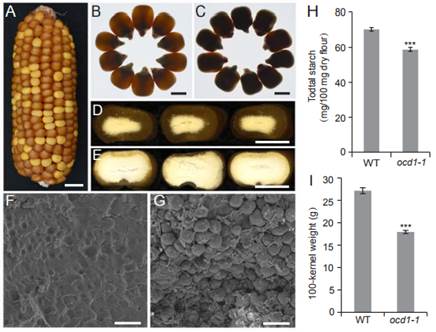研究发现植物草酸代谢途径关键酶影响玉米营养品质
来源:《植物细胞》
作者:Wanwan Shen等
时间:2018-10-08


9月10日,The Plant Cell 在线发表了中国科学院分子植物科学卓越创新中心/植物生理生态研究所巫永睿研究组题为Maize Oxalyl-CoA Decarboxylase1 Degrades Oxalate and Affects the Seed Metabolome and Nutritional Quality 的研究论文。该研究克隆和功能解析了玉米草酸降解途径中的关键酶——草酰辅酶A脱羧酶,揭示了草酸代谢参与籽粒储藏物质积累和营养品质形成的分子机理。
草酸是最简单的二元酸,在植物体内的含量非常高。草酸在调控金属胁迫、离子平衡和昆虫防御等方面起积极作用。然而,过量草酸不仅会影响植物自身发育,也会影响包括钙元素在内的多种矿物金属矿物元素的利用;人体从食物中摄入草酸过多会和钙形成草酸钙,诱发形成肾结石。有报道显示,植物体内存在草酸合成和降解途径,其中一条降解途径由四种酶共同作用,分别为草酰辅酶A合成酶、草酰辅酶A脱羧酶、甲酰辅酶A水解酶和甲酸脱氢酶。草酰辅酶A合成酶可以催化草酸形成草酰辅酶A,接着草酰辅酶A在脱羧酶的作用下形成甲酰辅酶A。草酰辅酶A合成酶在多种植物中均被发现,然而却未有草酰辅酶A脱羧酶的报道,在农作物玉米中,草酸的降解代谢途径还未知,草酸与玉米籽粒发育、营养物质存储和品质调控的关系也不清楚。
在此项研究中,巫永睿研究组克隆了玉米草酰辅酶A脱羧酶(Oxalyl-CoA Decarboxylase1,OCD1)基因,该基因突变以后籽粒胚乳呈现出粉质的表型,同时籽粒的储存物质合成和粒重也发生下降。由于没有商业化的草酰辅酶A脱羧酶底物草酰辅酶A,研究人员尝试了多种方法,合成了较高纯度的草酰辅酶A。体外和体内的酶活实验证实草酰辅酶A脱羧酶可以降解草酰辅酶A产生甲酰辅酶A和二氧化碳。同时,研究人员还发现早先克隆的玉米经典高赖氨酸突变体基因opaque7(o7)编码草酰辅酶A合成酶,并证明O7可以催化草酸形成草酰辅酶A。另外,靶向和非靶向代谢组学分析发现,玉米草酰辅酶A基因突变后籽粒胚乳的能量代谢、糖类、氨基酸以及激素含量均受到显着影响。该项研究阐明了玉米草酸代谢的前两步反应,并揭示了草酸降解途径与籽粒胚乳发育、代谢和营养品质的关系,为将来遗传改良草酸含量较高的蔬菜(如菠菜)等提供了候选基因和分子机制。
该工作主要由巫永睿研究组副研究员杨俊和博士生付苗苗合作完成。博士生冀晨、黄永财参与了相关工作。研究工作得到科技部、国家自然科学基金、中科院等的资助。(来源:上海生命科学研究院)
Maize Oxalyl-CoA Decarboxylase1 Degrades Oxalate and Affects the Seed Metabolome and Nutritional Quality
Abstract The organic acid oxalate occurs in microbes, animals and plants; however, excessive oxalate accumulation in vivo is toxic to cell growth and decreases the nutritional quality of certain vegetables. However, the enzymes and functions required for oxalate degradation in plants remain largely unknown. Here, we report the cloning of a maize (Zea mays) opaque endosperm mutant that encodes oxalyl-CoA decarboxylase1 (EC4.1.1.8; OCD1). Ocd1 is generally expressed and is specifically induced by oxalate. The ocd1 mutant seeds contain a significantly higher level of oxalate than the wild type, indicating that the ocd1 mutants have a defect in oxalate catabolism. The maize classic mutant opaque7 (o7) was initially cloned for its high lysine trait, although the gene function was not understood until its homologue in Arabidopsis thaliana was found to encode an oxalyl-CoA synthetase (EC 6.2.1.8), which ligates oxalate and CoA to form oxalyl-CoA. Our enzymatic analysis showed that ZmOCD1 catalyzes oxalyl-CoA, the product of O7, into formyl-CoA and CO2 for degradation. Mutations in ocd1 caused dramatic alterations in the metabolome in the endosperm. Our findings demonstrate that ZmOCD1 acts downstream of O7 in oxalate degradation and affects endosperm development, the metabolome, and nutritional quality in maize seeds.
原文链接:http://www.plantcell.org/content/plantcell/early/2018/09/10/tpc.18.00266.full.pdf




